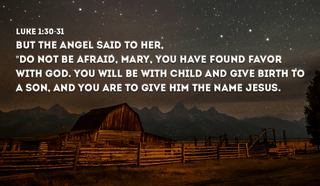- Recent Translations
- All Translations
Lukas 1
Share
Settings
Lukas 1 Commentary
Chapter 1
This evangelist is generally supposed to have been a physician, and a companion of the apostle Paul. The style of his writings, and his acquaintance with the Jewish rites and usages, sufficiently show that he was a Jew, while his knowledge of the Greek language and his name, speak his Gentile origin. He is first mentioned ( acts 16:10 acts 16:11 ) , as with Paul at Troas, whence he attended him to Jerusalem, and was with him in his voyage, and in his imprisonment at Rome. This Gospel appears to be designed to supersede many defective and unauthentic narratives in circulation, and to give a genuine and inspired account of the life, miracles, and doctrines of our Lord, learned from those who heard and witnessed his discourses and miracles.
The Preface. (1-4) Zacharias and Elisabeth. (5-25) Christ's birth announced. (26-38) Interview of Mary and Elisabeth. (39-56) The birth of John the Baptist. (57-66) The song of Zacharias. (67-80)
1-4. Luke will not write of things about which Christians may safely differ from one another, and hesitate within themselves; but the things which are, and ought to be surely believed. The doctrine of Christ is what the wisest and best of men have ventured their souls upon with confidence and satisfaction. And the great events whereon our hopes depend, have been recorded by those who were from the beginning eye-witnesses and ministers of the word, and who were perfected in their understanding of them through Divine inspiration.
Verses 5-25 The father and mother of John the Baptist were sinners as all are, and were justified and saved in the same way as others; but they were eminent for piety and integrity. They had no children, and it could not be expected that Elisabeth should have any in her old age. While Zacharias was burning incense in the temple, the whole multitude of the people were praying without. All the prayers we offer up to God, are acceptable and successful only by Christ's intercession in the temple of God above. We cannot expect an interest therein if we do not pray, and pray with our spirits, and are not earnest in prayer. Nor can we expect that the best of our prayers should gain acceptance, and bring an answer of peace, but through the mediation of Christ, who ever lives, making intercession. The prayers Zacharias often made, received an answer of peace. Prayers of faith are filed in heaven, and are not forgotten. Prayers made when we were young and entering into the world, may be answered when we are old and going out of the world. Mercies are doubly sweet that are given in answer to prayer. Zacharias shall have a son in his old age, who shall be instrumental in the conversion of many souls to God, and preparing them to receive the gospel of Christ. He shall go before Him with courage, zeal, holiness, and a mind dead to earthly interests and pleasures. The disobedient and rebellious would be brought back to the wisdom of their righteous forefathers, or rather, brought to attend to the wisdom of that Just One who was coming among them. Zacharias heard all that the angel said; but his unbelief spake. In striking him dumb, God dealt justly with him, because he had objected against God's word. We may admire the patience of God towards us. God dealt kindly with him, for thus he prevented his speaking any more distrustful, unbelieving words. Thus also God confirmed his faith. If by the rebukes we are under for our sin, we are brought to give the more credit to the word of God, we have no reason to complain. Even real believers are apt to dishonour God by unbelief; and their mouths are stopped in silence and confusion, when otherwise they would have been praising God with joy and gratitude. In God's gracious dealings with us we ought to observe his gracious regards to us. He has looked on us with compassion and favour, and therefore has thus dealt with us.
Verses 26-38 We have here an account of the mother of our Lord; though we are not to pray to her, yet we ought to praise God for her. Christ must be born miraculously. The angel's address means only, Hail, thou that art the especially chosen and favoured of the Most High, to attain the honour Jewish mothers have so long desired. This wondrous salutation and appearance troubled Mary. The angel then assured her that she had found favour with God, and would become the mother of a son whose name she should call Jesus, the Son of the Highest, one in a nature and perfection with the Lord God. JESUS! the name that refreshes the fainting spirits of humbled sinners; sweet to speak and sweet to hear, Jesus, a Saviour! We know not his riches and our own poverty, therefore we run not to him; we perceive not that we are lost and perishing, therefore a Saviour is a word of little relish. Were we convinced of the huge mass of guilt that lies upon us, and the wrath that hangs over us for it, ready to fall upon us, it would be our continual thought, Is the Saviour mine? And that we might find him so, we should trample on all that hinders our way to him. Mary's reply to the angel was the language of faith and humble admiration, and she asked no sign for the confirming her faith. Without controversy, great was the mystery of ( 1 Timothy. 3:16 ) nature must be produced so, as it was fit that should be which was to be taken into union with the Divine nature. And we must, as Mary here, guide our desires by the word of God. In all conflicts, let us remember that with God nothing is impossible; and as we read and hear his promises, let us turn them into prayers, Behold the willing servant of the Lord; let it be unto me according to thy word.
Verses 39-56 It is very good for those who have the work of grace begun in their souls, to communicate one to another. On Mary's arrival, Elisabeth was conscious of the approach of her who was to be the mother of the great Redeemer. At the same time she was filled with the Holy Ghost, and under his influence declared that Mary and her expected child were most blessed and happy, as peculiarly honoured of and dear to the Most High God. Mary, animated by Elisabeth's address, and being also under the influence of the Holy Ghost, broke out into joy, admiration, and gratitude. She knew herself to be a sinner who needed a Saviour, and that she could no otherwise rejoice in God than as interested in his salvation through the promised Messiah. Those who see their need of Christ, and are desirous of righteousness and life in him, he fills with good things, with the best things; and they are abundantly satisfied with the blessings he gives. He will satisfy the desires of the poor in spirit who long for spiritual blessings, while the self-sufficient shall be sent empty away.
Verses 57-66 In these verses we have an account of the birth of John the Baptist, and the great joy among all the relations of the family. He shall be called Johanan, or "Gracious," because he shall bring in the gospel of Christ, wherein God's grace shines most bright. Zacharias recovered his speech. Unbelief closed his mouth, and believing opened it again: he believers, therefore he speaks. When God opens our lips, our mouths must show forth his praise; and better be without speech, than not use it in praising God. It is said, The hand of the Lord was working with John. God has ways of working on children in their infancy, which we cannot account for. We should observe the dealings of God, and wait the event.
Verses 67-80 Zacharias uttered a prophecy concerning the kingdom and salvation of the Messiah. The gospel brings light with it; in it the day dawns. In John the Baptist it began to break, and increased apace to the perfect day. The gospel is discovering; it shows that about which we were utterly in the dark; it is to give light to those that sit in darkness, the light of the knowledge of the glory of God in the face of Jesus Christ. It is reviving; it brings light to those that sit in the shadow of death, as condemned prisoners in the dungeon. It is directing; it is to guide our feet in the way of peace, into that way which will bring us to peace at last, ( Romans 3:17 ) . John gave proofs of strong faith, vigorous and holy affections, and of being above the fear and love of the world. Thus he ripened for usefulness; but he lived a retired life, till he came forward openly as the forerunner of the Messiah. Let us follow peace with all men, as well as seek peace with God and our own consciences. And if it be the will of God that we live unknown to the world, still let us diligently seek to grow strong in the grace of Jesus Christ.
Lukas 1 Commentaries
Chapter Summary
INTRODUCTION TO LUKE
The writer of this Gospel, Luke, has been, by some, thought, as Origen {a} relates, to be the same with Lucius, mentioned in Ro 16:21, but he seems rather to be, and without doubt is, Luke the beloved physician, who was a companion of the Apostle Paul in great part of his travels in the Gentile world: he came with him to Jerusalem, and from thence accompanied him to Rome, and continued with him when in prison, and was with him to the last; see Ac 16:10,11 \Col 4:14 2Ti 4:11 Phm 1:24\. Jerom {b}, and others, say, he was a physician of Antioch in Syria; where it may be the Apostle Paul met with him, and might be the happy instrument of his conversion; so that he seems to be, by nation, a Syrian, as Jerom {c} calls him. Grotius thinks his name is Roman, and that it is the contraction of Lucilius. It is not an Hebrew name, but might be in common use in Syria; for though the Jews reckon owqwl, "Lukus", among foreign names, yet say {d} a it was a very illustrious one, and well known to them, as it may well be thought to be if Syriac, the language being spoke by them: and many Jews lived in Syria, and particularly in Antioch. Some say that this Gospel was written by the advice, and assistance, and under the direction of the Apostle Paul, as the Gospel according to Mark was by that of Peter; though the following preface does not seem so well to accord with this. Eusebius says {e} that it was the sense of the ancients, that whenever the Apostle Paul makes mention of his Gospel, he intends this according to Luke. The time of the writing of it is not certain; some say it was written in the fifteenth year after the ascension of our Lord; others in the twenty second; and others in the twenty seventh. It is commonly thought to have been written after the Gospels of Matthew and Mark, according to the order in which it stands; but this is rejected by some learned men, who rather think that Luke wrote first of all: and indeed, there are some things in his preface which look as if there had not, as yet, been any authentic account published, at least which was come to the knowledge of this evangelist. The place where he wrote it is also uncertain. Jerom says {f}, he wrote it in the parts of Achaia, perhaps at Corinth: according to the titles prefixed to the Syriac and Persic versions, he wrote it in Alexandria: the former of these runs thus;
``the Gospel of Luke, the Evangelist, which he spake and published in Greek in Alexandria the great.''
And the latter thus;
``the Gospel of Luke, which he wrote in the Greek tongue in Alexandria of Egypt.''
However, it is agreed on all hands, that it is genuine, and of divine inspiration. Eusebius {g} relates, that it was affirmed by some, that this Gospel, together with those of Matthew and Mark, were brought to the Apostle John, who approved of them, and bore witness to the truth in them.
{a} In Rom. xvi. 21. {b} Catalog. Script. Eccles. sect. 17. fol. 91. Euseb. Eccl. Hist. l. 3. c. 4. {c} Praefat in Luc. {d} T. Bab. Gittin, fol. 11. 2. & Gloss. in ib. {e} Ubi supra. (Hist. Eccl. l. 3. c. 39.) {f} Praefat in Luc. {g} Eccl. Hist. l. 3. c. 24.


